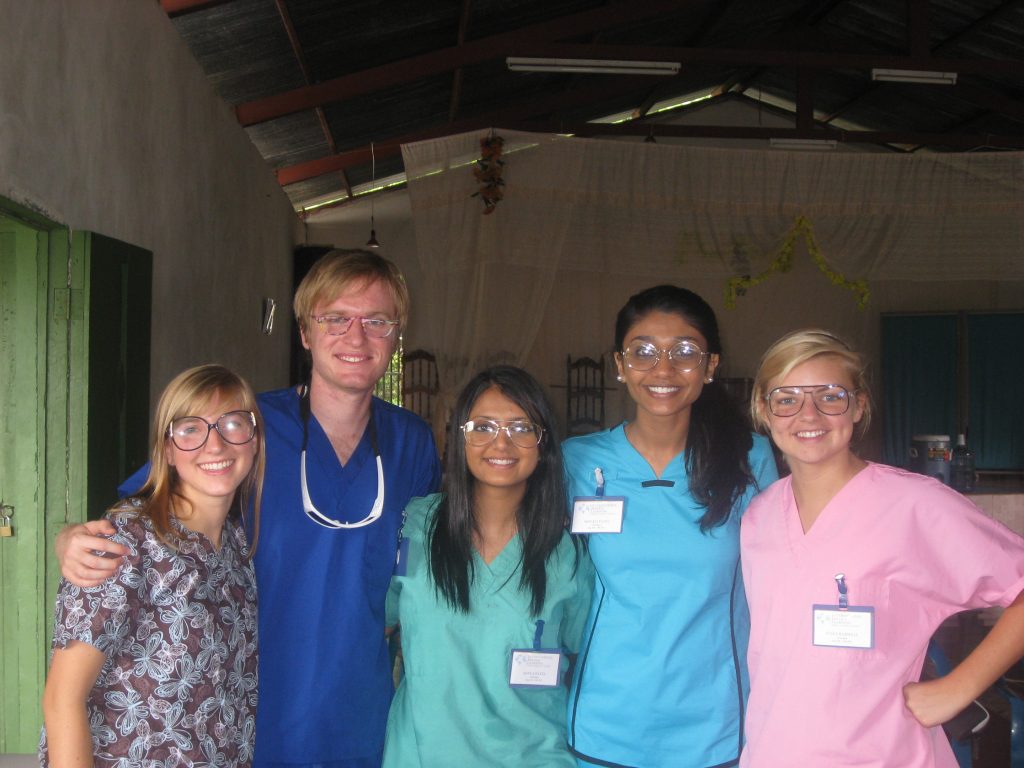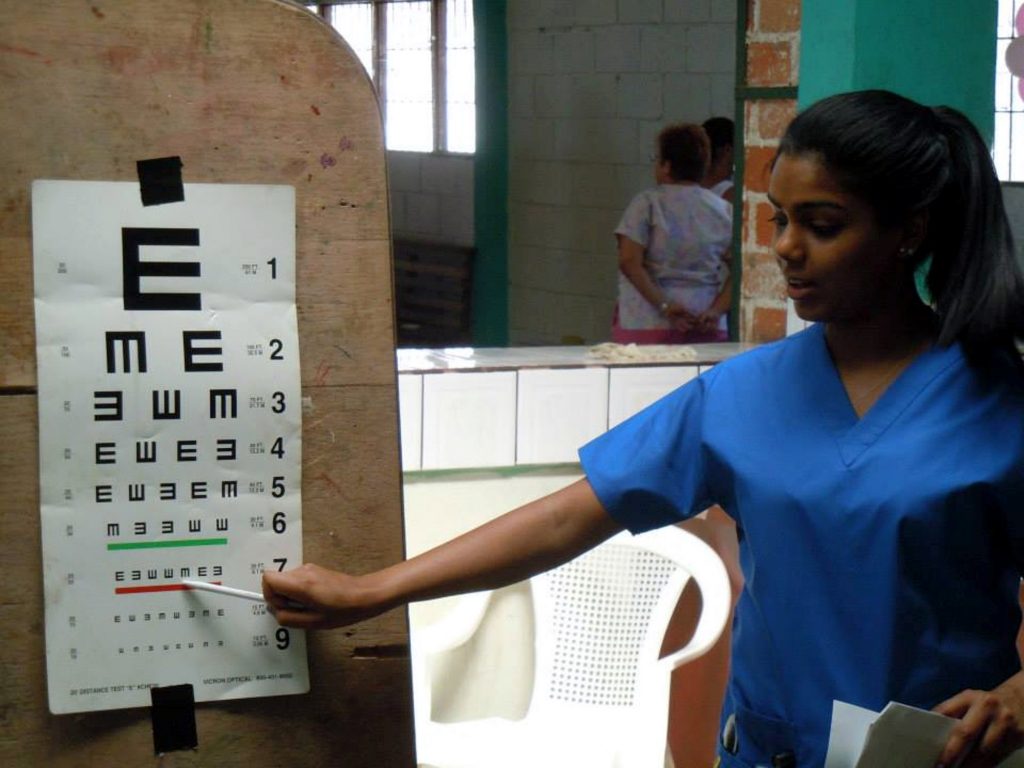Our goal is to provide experiential learning opportunities and cultural expansion for Optometrists and Optometry students while those in our partner communities benefit from a eye exam and treatment from a licensed medical professional.
About the Optometry Program
The World Health Organization has determined that lack of eye-care is one of the most crucial needs in developing countries. Because refractive needs and other eye problems don’t necessarily cause immediate pain, eye care is often under- prioritized when resources are limited – especially for children. Through ISL, thousands of the underserved have received eyewear and eye care.
In order to provide both quality eye care for those in need and appropriate, supervised field experience for volunteers, ISL utilizes a combination of eyewear distribution, in-home screenings, community clinics, and ISL subsidized referrals, in addition to providing eye care education.
Who Is Right For Optometry Teams?
ISL’s optometry teams are ideal for students of optometry at all education levels. Pre-optometry students are welcome! Optometry students are a valuable asset to any ISL health team.

What to Expect
Upon arrival in-country, you will be met at the airport by ISL staff. Your first day will be busy with orientation and intensive training seminars on topics such as basic eye health assessment and screening exams, visual acuity assessment, measuring pupillary distance, screening and measurement for possible refractive errors, eye health and safety (hygiene, nutrition, UV protection, and injury), criteria for referring patients to eye care professionals, patient interviews, measuring near/distance vision, pinhole occluder testing, screenings for binocular dysfunction, coordinated eye movement, limitations of visual field, color vision, pterygium, and Acanthosis Nigricans, use of the ophthalmoscope and retinoscope, and medical terminology (Spanish or Swahili).
On an optometry team, you will work in one of our partner communities in the following ways:
- Visit homes and provide visual health screenings
- Invite those with acute concerns to a field clinic staffed by a local optometrist
- Learn to maintain and manage support equipment, inventories, and supplies, and provide basic eye care instructions.
At the clinic, you will have the opportunity to rotate through stations doing the following:
- Patient intake
- Basic screenings
- Eyewear distribution stations
- Actively observe the optometrist perform exams
- Play with the community children!
Be aware: there will be virtually NO down-time during your ISL program. This is an immersive, intensive experience loaded with service activities and cultural exploration!
In the evenings, you will participate in educational seminars on ocular issues. There will also be designated time for group reflection – time to discuss and express what you’ve experienced in your day’s community work, either formally or informally.
Your team will eat most dinners out in order to relax and experience the local culture and cuisine. You will learn a few traditional dances and explore some important historical/cultural sites.
Recreational opportunities vary by location, but you will have opportunities like: shopping for local crafts and exploring geographic treasures such as beaches, volcanoes, rainforests, or caves. Traverse ruins, tour city centers, or trek through coffee plantations, and have time for other exciting activities such as ziplining, snorkeling, or safari!
Volunteer Involvement
Your team will visit homes and provide visual health screenings and invite those with acute concerns to a field clinic staffed by a local optometrist. At the clinic, you will have the opportunity to rotate through patient intake, basic screenings, and eyewear distribution stations, and actively observe the optometrist perform exams. You will also learn to maintain and manage support equipment, inventories, and supplies, and provide basic eye care instructions.
You may choose NOT to participate in any aspect of patient care with which you are uncomfortable.
ISL collaborates with in-country professionals and local Ministries of Health in order to determine how our volunteers can best impact developing communities. Level of volunteer participation is directly dependent on level of training. For example, each team has the potential for three levels of volunteer involvement: observer, assistant, and practitioner. Pre-optometry volunteers would fall into the “observer” category in terms of the examination/diagnosis/treatment process, but would be allowed hands on experience with non-invasive procedures such as patient intake and basic screenings, as determined by local Ministry of Health standards, while an optometry student might assist in the examination, diagnosis, and treatment process to the degree determined appropriate by local Ministry of Health standards.
Safety and Respect
Respect of our patients
Patient consent is, of course, an essential pre-requisite for any level of volunteer participation. All patients sign a consent form to be seen by a doctor with students observing – we have their complicit consent to treat prior to their intake and examination.
Our patients are protected from exploitation – we are discreet and respectful. We do NOT under any circumstances take photo of any procedure during a patient’s visit. Furthermore, patient rights must be respected at all times; Patients have the right to refuse treatment.
ISL prohibits discrimination on the basis of color, national origin, disability, sex, gender identity, religion or any other factor.
Volunteer Safety
For the sake of security, ISL volunteers remain together as a team from arrival to departure, and are accompanied by ISL staff at all times.
The safety of our volunteers is our number one priority. ISL has offices in all of the countries that we serve. That means wherever you go, rest assured, we’re there too. All ISL regional staff members are thoroughly screened to ensure the safety of your team’s local interactions and we continuously monitor and address all emerging health and safety issues in each of the countries we operate.
Specific precautions taken by ISL:
- ISL teams avoid large, crowded areas like sporting events whenever possible
- We continuously monitor local media and information sources in each of our countries through our on-site staff, and take appropriate actions to avoid areas of concern
- Our on-site staff provide feedback on the local situation in each community we work, and if recommendations are made to change itineraries or programming, we do so immediately
- Our management team relies on the advice of a number of organizations including the U.S. State Department, the World Health Organization and Centers for Disease Control, the Federal Aviation Administration, the National Transportation Safety Board, as well as an international safety and security organization. If conditions exist that may hinder our ability to provide a safe program, we will alter the itinerary and redirect the program to safer regions or provide other alternatives.

What To Bring
You will need:
- Stethoscope
- Blood pressure cuff
- Otoscope
- Scrubs
- Donations of medications
- Medical supplies (optional), and
- Refillable water bottle (i.e. Nalgene bottle)
- Funds sufficient to cover one meal per day, recreation, incidentals, souvenirs and departure tax (where applicable).
- An open-mind
- A sense of adventure
- A heart of service
What ISL Provides
- 24-hour accompaniment by professional, bilingual staff
- Airport pickup/drop off
- All ground transportation
- All lodging
- Two meals per day
- Drinking water
- Instruction by licensed medical professionals
- Medications and supplies
- Quality experiential learning
- A meaningful glimpse into another culture
- An unforgettable adventure
